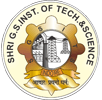Institute Vision
A front-line institute in science and technology making significant contributions to human resource development envisaging dynamic needs of the society.
Institute Mission
To generate experts in science and technology akin to society for its accelerated socioeconomic growth in professional and challenging environment imparting human values.
Department Vision
To contribute for teaching excellence to generate human resource to cater the needs of industries and hospitals for affordable healthcare through research and innovation.
Department Mission
To bridge the engineering, science and healthcare sectors for indigenous development and to impart community services for mass healthcare through continuous research.


